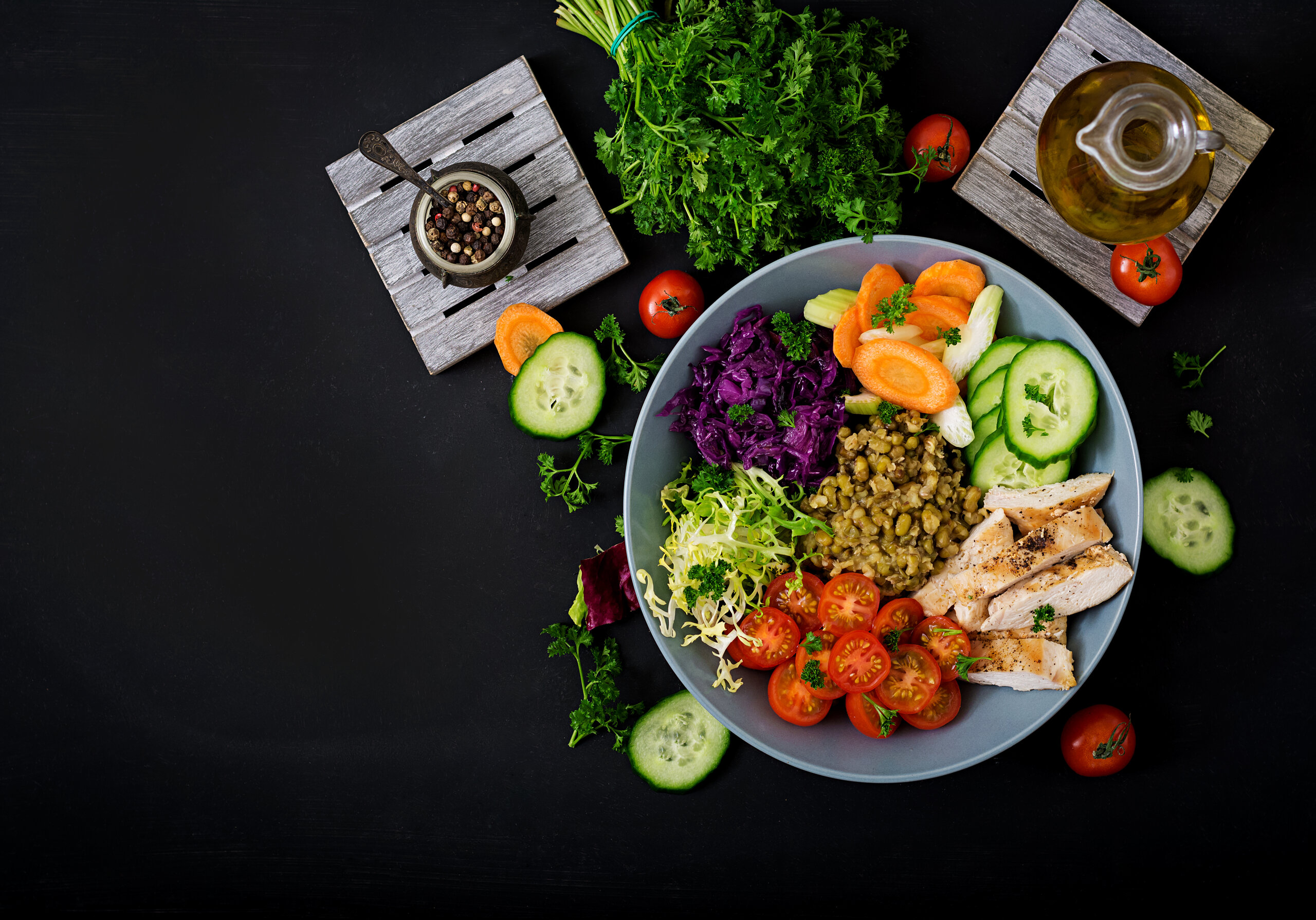Welcome to Open Learning College – Change your career, Increase your salary, and Improve your life.
 Course Overview
Course Overview 
Embark on a transformative learning journey with the UK’s most innovative home study provider, offering courses designed to unlock your true potential and facilitate the career change you desire. Access our distance learning courses directly from anywhere, anytime, and acquire industry-recognised Professional Qualifications essential for advancing in your career.
Specifically, explore the flexible and convenient Nutritional Therapy (Level 3) course, an ideal way to gain a diploma qualification. Whether you aim for further education, improved job prospects, or expanded knowledge, this comprehensive course allows you to prepare thoroughly for exams or careers through home study. Plus, it’s structured to be accessible and beneficial even if you have no prior knowledge in Nutritional Therapy.
Nutritional Therapy is the use of food and nutrition to maintain health and well-being through the understanding of the principles and practice of nutritional therapy. The course teaches how to work with individuals through therapy using diet and nutrition. An assessment is carried out, and then together with the client, a holistic diet plan is developed so that specific changes are made to enhance the benefits from what is eaten, such as curbing ill health, maintaining good condition of e.g. hair and skin. Nutritional therapy is a complementary therapy often used with conventional therapy so that a more holistic approach is used, so they cannot diagnose serious illness but are able to address ill health with conventional medicine, e.g. fatigue to Arthritis. Advice is given to clients so that full enjoyment of life can be had with regard to nutrition and the quality of one’s diet, such as eating in restaurants, through the use of better choices of what is ingested.
 Course Key Topics
Course Key Topics
the Nutritional Therapy (Level 3) course is divided into 10 modules.
Module 1: The Inflammation Syndrome
Most people consider inflammation to cause tenderness and muscle ache e.g. back ache and stiff joints, but inflammation causes and is related to a whole host of ill health such as allergy, heart problems, bronchitis, Arthritis and Alzheimer’s disease. This first module concentrates on exploring what is meant by “The Inflammation Syndrome”, in relation to diet and nutrition, health and well-being. The causes of inflammation within our bodies and what triggers it are investigated. The value of anti-inflammatory drugs in combating inflammation, or whether we need to look more closely at what we eat and drink and the supplements we take, in order to prevent disease and illness in the long-term is discussed. How food, diet and nutrition can be used to combat the various ailments arising from the inflammation syndrome is considered.
Module 2: Profiles of Different Foods and Drinks
The key to healthy living in the long term is the management and balance of the amount, type and quality of food and drink we consume. Excuses are made such as metabolic rate to blame unhealthy eating, but teaching people to be honest about recording what they eat is also important. The foods we eat are divided into 6 groups, namely, vegetables, fruit, grains and cereals, dairy products, meat and fish, and with the addition of certain “superfoods” for example yoghurt, broccoli and turkey. Certain foods are also thought to have healing properties and the key nutrients they contain are investigated. What we eat has to be balanced with what we drink. Finally, facts about alcohol and how bodies metabolise it, as well as the effects of alcohol on health is explored. How to collect information, such as recipes, especially for special diets, is advised so that a therapist has a range of useful sources to hand.
Module 3: Health and Nutrition During Different Life Stages
Healthy living, diet and exercise are important throughout all the stages of our life, and nutritional needs throughout the differing stages of life can be identified. So as people get older, for example, their lives become more sedentary and less food is needed. On the other hand, babies have special nutritional needs and a special diet. Similarly, as children are growing up, they have different nutritional requirements e.g. children need full-fat dairy products, rather than low-fat versions, and teenagers need high energy foods for growth and development. This pattern of growth slows down in adulthood, but, as people grow older, problems can arise, if the diet is not healthy and lacks activity. What constitutes a balanced diet for different people, how is food used by our body and how can diet plans be healthy and fun is discussed.
Module 4: Food Safety
In the UK, it is possible to obtain any food at any time of the year, made into several recipes and available in different forms, e.g. we can get papaya and pineapple dried, fresh, in tins or as part of dessert. The way food is available fresh or processed, and how it is prepared has to be healthy and safe for consumption. This module discusses different food preparation processes and raises questions about food safety, including the careful handling, cooking and storage of foods. The substances and chemicals added to foods to help preserve, flavour and make it palatable or appear or taste a certain way is explored. What is meant by genetically modified foods is explored. The ways of avoiding food poisoning, how to stay safe when storing, cooking food and the key things needed to be known about food when travelling is discussed.
Module 5: The Organic Question
At one time all food was organic, but this changed when pesticides were added to prevent attack by insects or fertilizers were added to increase yield of the crops. People choose to buy and consume organic products, because they want a safer and healthier alternative to foods that may contain toxic pesticides and chemicals. Organic food is now easier to find, not only in health food stores and supermarkets, but also in restaurants and some schools and colleges. This module looks at what organic food is and how it is produced, as well as why it is healthier than conventional choices. It also considers the disadvantages of conventional foods, such as the cost, not only to our health and well – being, but also to the environment. Detoxification and its health benefits are considered in detail. As food is so cheap and readily available, the ease of gaining weight and the need to exercise is discussed briefly.
Module 6: Treating Ailments and Illnesses Through Nutrition – Part 1
The following three modules provide advice on how to treat ailments and illnesses, with particular reference to a key body organ through good nutrition and the use of particular foods and liquids, alongside conventional medicine. The first discussion focuses on skin disorders, digestive illnesses, respiratory illnesses, urinary diseases and ailments of the ears, nose, throat, mouth and eyes. An in-depth study of the body part or organ helps form an understanding of the possible causes of disorders and illnesses that affect it. How good quality foods and diet affect and prevent or deter common ailments and limit e.g. stress is investigated. Food, through over-eating or consumption of bad or unsafe food can be problematic, e.g. chocolate can cause acne and spots.
Module 7: Treating Ailments and Illnesses Through Nutrition – Part 2
This module concentrates on the organs and body parts affected by heart and circulatory disorders e.g. high blood pressure and cholesterol, disorders of the immune and nervous systems, brain disorders and cancer. The common illnesses and diseases discussed also include strokes, Diabetes, anxiety and stress, and minor issues such as varicose veins.
Module 8: Treating Ailments Specific to Women
Women are affected from disorders or issues specific to their gender including, premenstrual tension and the menopause. Diet and nutrition can help alleviate many of the symptoms of these disorders, as well as more serious illnesses, for example, breast and ovarian cancer. Pregnancy is also considered, in relation to healthy living and good nutrition. There is evidence to suggest that many foods may slow down the ageing process and these are identified. Regular consumption of foods to improve the strength of our skin and slow down the age-related damage, which affects our eyes, e.g. nuts like almonds and foods containing antioxidants is explored. The misuse of food or eating disorders, e.g. Anorexia nervosa and Bulimia, as well as the importance of vitamins and mineral salts and the need for a balanced diet containing superfoods is discussed.
Module 9: Treating Ailments Specific to Men
In this module, we concentrate on the issues, which mainly concern men, that is, hair and muscle loss, impotence and prostate and testicular cancer. Appearance, weight, anxiety and stress also feature. Weight is linked to lifestyle. Stress can make a person fat. With a man’s metabolic rate being at its highest when he is 27 years old, with it dropping by 12% each year until he reaches the age of 47, it follows that if he continues to consume the same amount of calories, he will put on weight. We look at how a man can increase and maintain muscle mass and, consequently, help to lessen this fall in his metabolic rate. The role of food and exercise in men’s wellbeing is essential, a diet rich in protein, vegetables, superfoods, and limit alcohol and cigarettes, for example, is clearly important.
Module 10: Setting up in Business as a Nutritional Therapist
The internet has opened the door for great support and free resources e.g. templates of essential paperwork such as a business plans or invoices, and support groups for people wanting to or running their own business. In this final module, we deal with all the issues and bureaucracy involved concerned with setting up in business as a nutritional therapist, e.g. marketing to clients, finances, legal issues, building and maintaining a successful nutritional therapy business. The advantages and disadvantages of being self-employed or working for others is compared.
(Please click on the curriculum tab above to see a detailed view of each module)
Course Content
Nutritional Therapy (Level 3) – FREE Starter Pack
How to…. (a series of explainer videos)
Module 1 – The Inflammation Syndrome
Module 2 – Profiles of Different Foods and Drinks
Module 3 – Health and Nutrition During Different Life Stages
Module 4 – Food Safety
Module 5 – The Organic Question
Module 6 – Treating Ailments and Illnesses Through Nutrition – Part 1
Module 7 – Treating Ailments and Illnesses Through Nutrition – Part 2
Module 8 – Treating Ailments Specific to Women
Module 9 – Treating Ailments Specific to Men
Module 10 – Setting up in Business as a Nutritional Therapist
Course Resources
Final Exam
College Announcements
🔍 Unlock the Nutritional Therapy Level 3 with £50 OFF the Course! 🥦💷
Ready to nourish your knowledge and explore the world of nutritional therapy?
For a limited time, seize the opportunity to enrol in our Nutritional Therapy Level 3 course with an exclusive £50 discount!
Use code NUTRITION50 at checkout before the month concludes!
🌟 Why Choose Our Nutritional Therapy Level 3 Course
Presented by Open Learning College, this course is your pathway to understanding the science of nutrition and its impact on health. Dive into comprehensive modules covering essential topics—from dietary analysis to personalized nutritional plans. Gain practical insights into promoting well-being through proper nutrition.
💡 What Makes Our Course Shine
Expert Guidance: Benefit from experienced tutors providing support throughout your learning journey.
Real-World Skills: Acquire practical knowledge crucial for success in the field of nutritional therapy.
Flexible Learning: Tailor your studies to your schedule with 24/7 access to course materials.
Don't miss this chance to unlock the secrets of nutritional therapy at a discounted rate! Enrol now, use code NUTRITION50* at checkout, and embark on your journey towards becoming a skilled nutritional therapist. 💷🌿
*This discount code cannot be used in conjunction with any other offer.









 Get Social!
Get Social!











Rebecca Harris